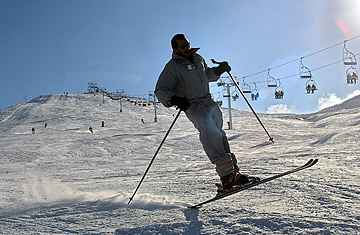
A skier skis down the slope in the ski resort of Faraya-Mzaar, northeast of Beirut, Lebanon.
Faraya is just an hour north of Beirut by car, and the short distance means you can attend a dinner party in town on Saturday night, get your full eight hours of sleep, and still be on the slopes by around 10 the next morning. And since Lebanese social circles are — like the country itself — pretty small, chances are you'll see some of your dinner companions from the previous evening on the mountain, too.
Skiing is possible in Lebanon because the swift rise of the coastal mountain range, coming after the broad expanse of the open Mediterranean, creates updrafts that keep the high country cold even when it might be 60 or 70 degrees at the shore. While the old tourism industry cliché that in Lebanon you can go alpine skiing in the morning and water skiing in the afternoon might be technically true, I don't know anyone who's tried. Even in late March (which is about as long as the ski season lasts) the sea is too cold for much more than a quick dip. But it's exhilarating enough just sliding off a chairlift and seeing the Mediterranean on one side and Biblical Mt. Hermon on the other. Pinch yourself: the Arabian Peninsula is that-a-way.
Even on the slopes, however, it's hard to escape current events. The political crisis between the Lebanese government and the Hizballah-led opposition that has turned the capital into a semi-permanent protest zone has also scared off foreign tourists, a crucial part of the economy. Bookings are down by as much as 60 percent from last year at Skileb, an online ski package operator that deals mostly with foreigners. Although skiing represents only about 10% of Lebanon's tourism market, Lebanon's economy is under such duress after the past summer's war with Israel that the country needs every ski bunny it can get.
Faraya's slopes and parking lots, even on a glorious Sunday afternoon, aren't nearly as crowded as the should be. There's also a noticeable dearth of headscarves and Hummers. Most Lebanese who ski are either Christians (Faraya is deep in the Christian highlands) or Muslims who tend towards the stylish and secular. But the resort typically attracts many tourists from the Gulf and neighboring Arab countries, who have more traditional tastes: they like their cars big and their women covered.
They'll be back soon though, according to Ronald Sayegh, the founder of Skileb. "Arabs understand the situation," he said. "The nice thing is that once it's calm, they are always ready to come to Lebanon. As long as we have snow." Indeed, with hardly any snow in the Alps thanks to an extraordinarily mild winter in Europe, desperate Western powder hounds may not have much alternative to doing their skiing in the Middle East.
Nor is there much anxiety evident amid the Faraya set. As they head back down from the hills to the coast, many families will have a strange new white hood ornament on their cars. Snowmen are a winter status symbol that tell everyone in your home village that you've been up in the mountains for the weekend. The fact that the snowmen often block windshield visibility doesn't seem to bother anyone. Indeed, a certain joie de vivre in the face of danger is as Lebanese as the cedar tree. As my Lebanese skiing buddy, Alex, said when an errant snowboarder went crashing through the plastic orange protective webbing separating skiers and the lunchtime crowd sunning themselves at a base lodge: "They ski like they drive."
